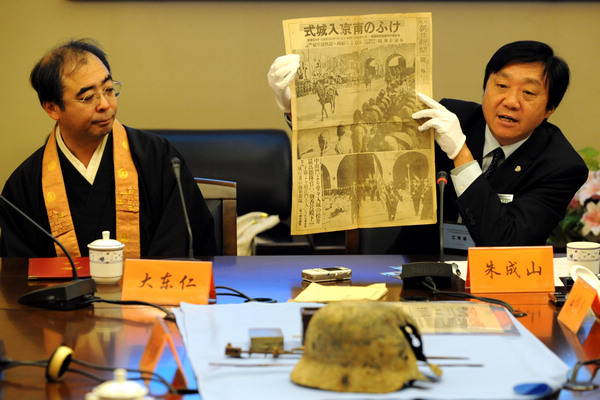Nanjing survivors turn to weibo to keep memory alive
 0 Comment(s)
0 Comment(s) Print
Print E-mail
China Daily, December 14, 2011
E-mail
China Daily, December 14, 2011
While the city marked the 74th anniversary of the Nanjing Massacre on Tuesday, survivors have taken to micro blogs to tell about their experiences during the historic period.
At 10 am on Tuesday, as sirens wailed across the city of Nanjing and people gathered in squares to mark the grim anniversary, 74-year-old Zhao Zhenhua wrote on her micro blog: "The sirens are taking me back to that miserable historic period. I pray for my compatriots who died in the tragedy, and I hope they know that I am enjoying a happy life today."
Zhao is one of six survivors of the massacre who have accounts on SinaWeibo, the country's most popular micro blog website, where the words of other witnesses to the horror, too, were posted by their children and grandchildren.
Some posts had photos of relatives from the time of the massacre and some told how they managed to escape the carnage.
As invading Japanese troops occupied Nanjing on Dec 13, 1937, and were about to launch a six-week massacre, Zhou Shaohua, 17, had no idea of the emerging danger until he saw the soldiers escorting four men tied with rope walking on a street in Gulou district.
"My father said he heard shouts when he saw those soldiers, and he immediately started to run, and the soldiers began firing at him. Later he ran into a French church and managed to escape the mass murder," the son of the 91-year-old wrote on his micro blog. Chinese records show that more than 300,000 people - not only unarmed soldiers, but also civilians - were butchered during the six weeks of terror.
Zhao Zhenhua said she hesitated to open an account because she cannot manage it by herself and needs her daughter's help at times.
"But I thought it is an important thing to tell my little piece of the truth about the atrocities, as someone who experienced them," Zhao said on her micro blog.
According to the Memorial Hall of the Victims in Nanjing Massacre by Japanese Invaders, only 200 survivors of the 1937 massacre remain in the city.
Some were invited to the memorial activities, which began on Monday.
On Monday evening, more than 150 students and teachers and dozens of Chinese and Japanese monks took part in a vigil where, by the light of 3,000 candles, monks chanted sutras to commemorate the victims.
On Tuesday morning, survivors and Chinese and Japanese monks assembled in front of a wall inscribed with the names of victims of the massacre to mourn the dead and pray for peace.
The memorial hall received four Japanese artifacts about the war in Nanjing during that period. The items, donated by a Japanese monk, were two postcards and two newspapers from Nov 24 and Dec 17, 1937. They tell about the Japanese army celebrating a victory in Nanjing.
For some Nanjing residents, the sirens that sound each year are a summons to remember that dark period and to cherish the peaceful lives they now have.
"Residents of the formerly war-torn Nanjing are more aware of the preciousness of peace," Zhou Ping, a Nanjing resident, said in a speech at a public gathering of more than 5,000 people on Tuesday.
"Although I have no personal experience of that period, the sirens are to me more compelling than any other kind of reminder of the dark time," said Wang Lian, the granddaughter of a Nanjing Massacre survivor.
"We need to keep the past in mind, and that's necessary to prevent the tragedy from being repeated," she said.






